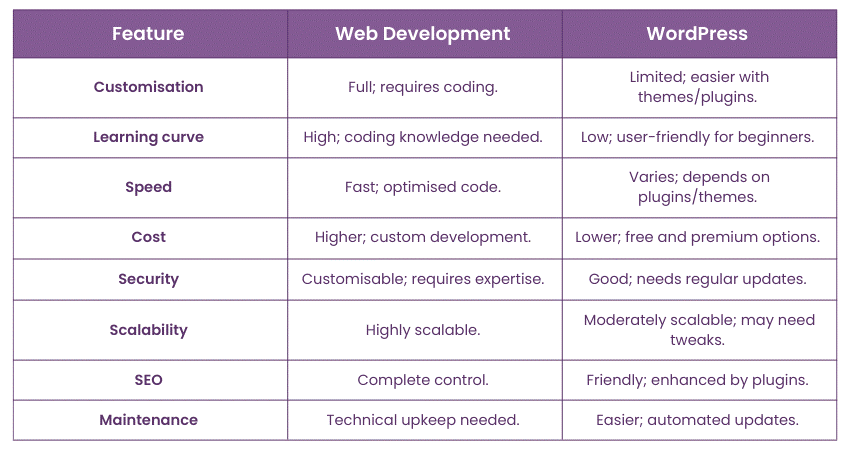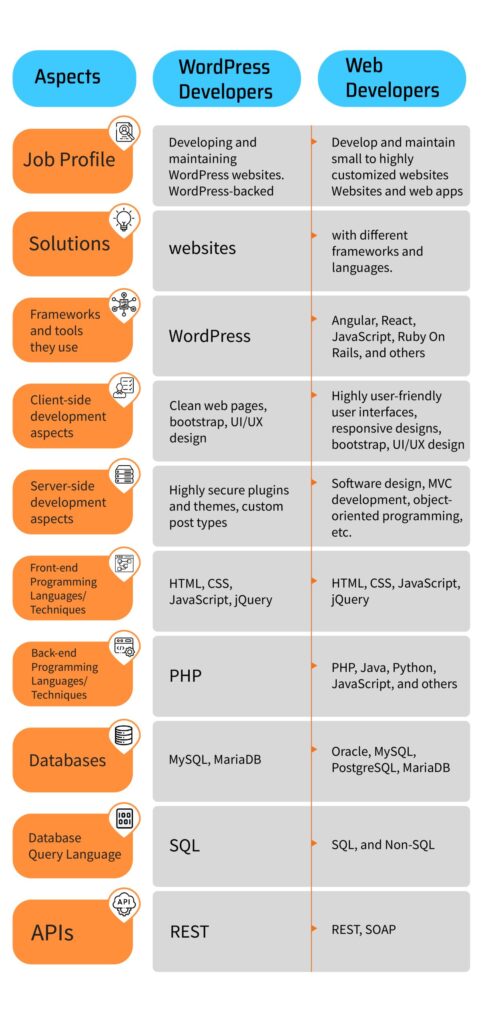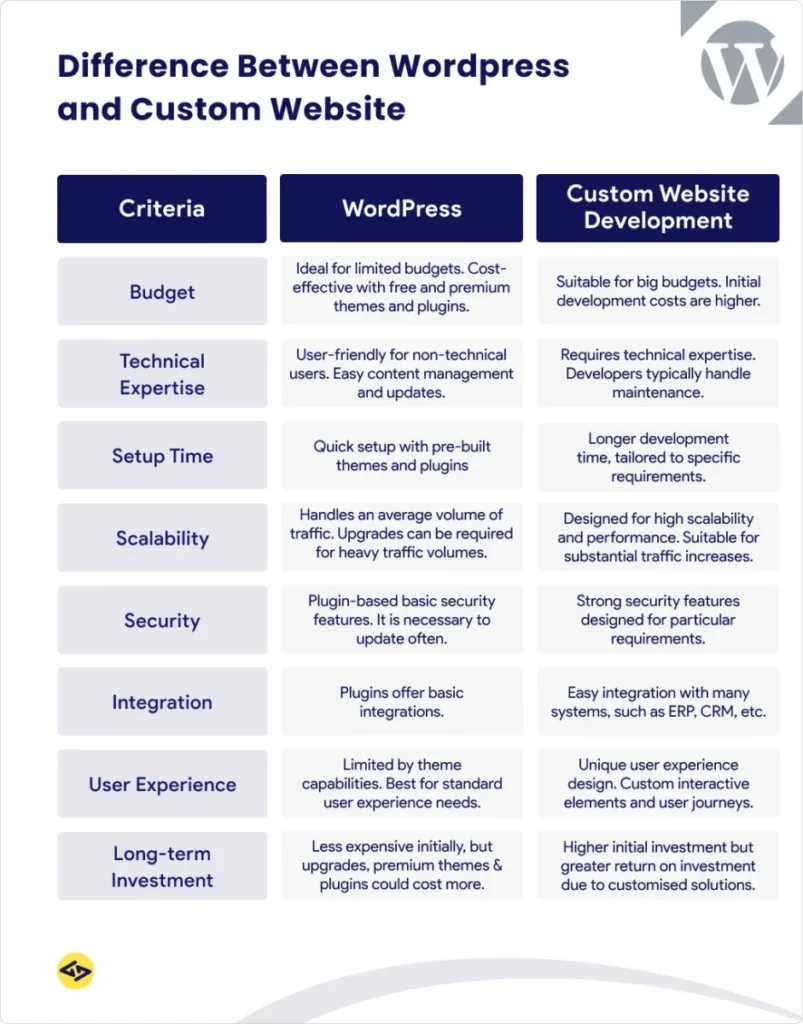Which Is Better, WordPress or Web Development? Full Comparison for Your Website Needs
When I think about building a website, I always notice the same question pops up: should I use WordPress or go for custom web development? Both options have their loyal fans and each promises to deliver the best results. The choice isn’t always clear especially if you want your site to stand out and perform well.
I’ve seen beginners gravitate toward WordPress for its simplicity and speed while more experienced developers often lean into custom solutions for flexibility. The decision really depends on what you need from your site and how much control you want over its features and design. Let’s look at what makes each approach unique so you can decide which path fits your goals best.

Understanding WordPress and Custom Web Development
WordPress and custom web development provide distinct pathways for building sites, each matching different needs and expectations. I compare their core features and highlight primary uses for clarity.
What Is WordPress?
WordPress is a content management system (CMS) enabling users to build and manage websites with minimal coding. I find that WordPress suits portfolios, blogs, e-commerce sites, and small business pages, where standardized templates and plugins are common. The platform runs on PHP and MySQL, offering 50,000+ themes and plugins (WordPress.org, 2024). I use its drag-and-drop features and built-in SEO tools to speed up launches and simplify maintenance.
What Is Custom Web Development?
Custom web development involves building sites from the ground up using programming languages like HTML, CSS, JavaScript, and server-side frameworks such as Laravel or Django. I tailor features, databases, and front-end designs to meet unique project requirements in applications like SaaS dashboards, advanced portals, and specialized e-commerce stores. This approach optimizes security, speed, and scalability where unique functions or integrations matter.
Comparison Table: WordPress vs. Custom Web Development
| Feature | WordPress | Custom Web Development |
|---|---|---|
| Setup Time | 1–7 days (template-based) | 30–120 days (fully unique) |
| Cost Range (USD) | $30–$5,000 (site + plugins/themes) | $2,500–$75,000 (custom project) |
| Skill Required | Basic; no coding for most setups | Advanced coding; technical expertise |
| Flexibility | Limited; plugin/theme ecosystem | Unlimited; feature by feature |
| Security | Standardized; plugin updates, vulnerabilities | Highly customizable; advanced controls |
| Scalability | Moderate; plugin-dependent | Excellent; infrastructure custom-tuned |
| Use Cases | Blogs, simple stores, portfolios | Web apps, large e-commerce, portals |
Both WordPress and custom web development address different web project goals, reflecting trade-offs in speed, flexibility, and total project control.

Comparing Key Features
Key features set WordPress apart from custom web development. In this section, I’ll evaluate major factors like flexibility, cost, security, and SEO.
Flexibility and Customization
WordPress offers extensive customization through themes and plugins, including Astra, Divi, and WooCommerce. I can adjust site layouts, add functions like contact forms, and install e-commerce without coding. Custom web development supports unique designs and workflows by leveraging frameworks such as React or Laravel. I can tailor the complete architecture, APIs, and data models to specific business needs. WordPress limits options when projects require deep backend or complex integrations, which custom code achieves easily.

| Flexibility Factor | WordPress | Custom Web Development |
|---|---|---|
| Design Range | Pre-made themes, limited | Fully custom, unlimited options |
| Plugin Integration | 59,000+ plugins | Any third-party or custom API |
| Code-level Adjustments | Limited | Full control |
| Use Case Fit | Blogs, portfolios, shops | SaaS, custom dashboards, apps |
Cost and Time Efficiency
WordPress speeds up site delivery, using templates and plugins to enable launches in hours or days. I find the setup cost lower, as hosting and domain services pair easily with one-click installations. Custom web development demands higher budgets and longer timeframes, involving strategy, UI/UX, development, and QA stages. Businesses pay more for tailored or large-scale projects.
| Cost & Speed Metric | WordPress | Custom Web Development |
|---|---|---|
| Development Time | 1–7 days typical | 1–12 weeks based on scope |
| Upfront Cost | $0–$500 for most projects | $2,000–$50,000+ |
| Iteration Speed | Fast (plugin-dependent) | Slower (manual code & review) |
Security Considerations
WordPress faces more widespread attacks due to its global use—Wordfence reports millions of daily threats targeting vulnerable plugins and themes. I improve safety by updating components but depend on third-party patching processes. Custom web development restricts attack vectors, avoids widespread exploits, and enables purpose-built security layers using frameworks like Laravel with built-in CSRF, XSS, and advanced authentication.
SEO Capabilities
WordPress simplifies on-page SEO with plugins like Yoast, ranking content structures, metadata, and schema. Site performance, however, can suffer from excessive plugins or unoptimized themes. Custom web development lets me implement fine-tuned SEO, including clean URLs, headless CMS support, and server-rendered pages for higher Google Lighthouse scores. I optimize core web vitals, structured data, and site speed directly in code.
| SEO Aspect | WordPress Features | Custom Web Development |
|---|---|---|
| Setup | Automated with plugins | Manual configuration |
| Technical SEO | Limited by themes/plugins | Fully configurable |
| Performance | Variable | Tuned for speed |
| Advanced Schema | Plugin or manual | Built-in, custom logic |
Use Cases: When to Choose WordPress or Custom Development
Different project requirements favor WordPress or custom web development. WordPress meets standard content needs quickly, while custom solutions address highly specific functionalities.
Ideal Scenarios for WordPress
WordPress offers efficiency for routine use cases. I use WordPress when fast setup and easy management are priorities, since its CMS structure streamlines launch and maintenance.
- Portfolios and Personal Blogs: Portfolio sites, photography showcases, and blogs benefit from WordPress themes and media integration.
- Small Business Websites: Local service businesses like salons, legal practices, or small retailers deploy WordPress for its contact forms, galleries, and map plugins.
- Basic E-commerce Stores: Shops with up to 200 products and standard checkout flows function well using WooCommerce with WordPress.
- Brochure or Landing Pages: Landing pages, product announcements, and event sites become live quickly using drag-and-drop page builders.
- Non-technical Teams: Content teams, marketers, and volunteers easily manage updates and plugin installations with minimal coding.
Example Table: Common WordPress Use Cases
| Use Case | Scalability | Customization Level | Time to Launch |
|---|---|---|---|
| Blog | Low | Moderate | 1-2 days |
| Portfolio | Low | Moderate | 1-2 days |
| Local Business | Medium | Moderate | 2-5 days |
| Small E-commerce | Medium | Moderate | 2-7 days |
| Event Landing Page | Low | Low | <1 day |
Ideal Scenarios for Custom Web Development
Custom web development supports advanced business goals. I rely on custom solutions for projects demanding full control, scalability, and non-standard features.
- Complex Applications: SaaS platforms, analytics dashboards, and enterprise resource planning tools with unique workflows prefer custom builds.
- High-Traffic Marketplaces: Large e-commerce stores with real-time inventory, multi-vendor support, or advanced search require custom solutions.
- Custom Integrations: Businesses integrating proprietary software, complex databases, or unique APIs depend on custom architectures.
- Enhanced Security: Finance, healthcare, or government sites handling sensitive user data follow stricter security protocols with bespoke code.
- Performance-Critical Sites: Streaming services, gaming portals, or large-scale media libraries need optimized performance and infrastructure flexibility.
Example Table: Common Custom Web Development Use Cases
| Use Case | Scalability | Customization Level | Time to Launch |
|---|---|---|---|
| SaaS Dashboard | High | Very High | 3-6 months |
| Large E-commerce Platform | High | Very High | 4-8 months |
| Marketplace | High | Very High | 5-9 months |
| Complex Casino Website | High | Very High | 5-10 months |
| Custom Web Portal | High | Very High | 3-7 months |
Projects like a complex casino website illustrate the value of custom development, as they require real-time gaming, player account systems, and dynamic reporting, exceeding the capabilities of most standard CMS setups.
Pros and Cons: Summary Overview
I compare WordPress and custom web development by outlining their main strengths and drawbacks across core decision factors. I use the following tables to highlight practical impacts for casino sites as well.
Pros and Cons Table
| Factor | WordPress | Custom Web Development |
|---|---|---|
| Setup Speed | Launch in 1–3 days with templates/plugins | Typical build in 3–12 weeks from scratch |
| Cost | $50–$400 setup, lower ongoing maintenance | $2,000+ setup, higher dev costs |
| Flexibility | User-friendly, limited deep customization | Full control, tailored to needs |
| Security | Large target, patchable but plugin risks | Custom security, fewer common exploits |
| Scalability | Suited for low to mid-traffic | Designed for high traffic scaling |
| Typical Use | Blogs, small shops, portfolios, casino blogs | SaaS, marketplaces, casinos, web portals |
| SEO | Good plugins, less code-level optimization | Maximum technical SEO control |
Casino Site Requirements Matrix
| Requirement | WordPress (Casino Applications) | Custom Web Development (Casino Solutions) |
|---|---|---|
| Game Integrations | Limited third-party plugins | Full direct integrations with game providers |
| User Accounts | Built-in lightweight options | Advanced user management, custom logic |
| Security | Standard encryption, plugin reliance | Custom anti-fraud, regulatory compliance, auditing |
| Payment Systems | Generic gateways via plugins | Secure payment flows, custom reporting, KYC |
| Bonuses Promo | Plugin-based, less robust control | Complex promo logic, loyalty systems, scripting |
| Performance | Moderate, requires optimization | Tunable for high-traffic, real-time transactions |
I see clear trade-offs for casino scenarios. WordPress delivers speed and simplicity for basic casino content or affiliate blogs. Custom web development meets advanced needs for regulated casino platforms, game lobbies, or unique player management, though with greater cost and technical investment.
Which Is Better, WordPress or Web Development? Our Verdict
I distinguish WordPress and custom web development by how they match the unique requirements of different projects. WordPress delivers for fast deployments, easy management, and lower upfront investment. Custom web development fits complex, high-traffic, or deeply integrated solutions that outgrow template-based platforms.
In my analysis, WordPress works best for portfolios, blogs, service sites, and startups aiming to launch quickly with minimal technical know-how. Custom web development dominates when bespoke functionality, high scalability, or advanced security become non-negotiable, such as enterprise dashboards or SaaS platforms.
Key differences stand out. Custom web projects need more planning, coding, and budget, but support future-proof scaling and granular control. WordPress, while versatile through plugins and themes, introduces efficiency, at the cost of certain limitations in integrations and enterprise-level performance.
Below, I’ve organized a direct comparison of context-driven decision factors.
| Criteria | WordPress | Custom Web Development |
|---|---|---|
| Setup Speed | 1-5 days (with themes or templates) | 30+ days (development from scratch) |
| Cost | Low ($50-$500 for basic site, plugins extra) | High ($2,000-$50,000+ for advanced customization) |
| Required Skills | Minimal (DIY, no coding required) | Advanced (HTML, CSS, JS, backend frameworks) |
| Flexibility | Moderate (theme/plugin limited) | Full (custom architecture, integrations, design) |
| Security | Standard (plugin-dependent, frequent updates) | Enhanced (custom protocols, less public exposure) |
| Scalability | Limited (plugin bloat risk) | Unlimited (tailored to traffic/performance needs) |
| Best For | Blogs, portfolios, small e-commerce, quick launches | SaaS, high-traffic stores, complex business logic |
| SEO Capabilities | Good (plugin-enabled, some performance tradeoffs) | Excellent (custom optimizations, lean performance) |
Casino Website Decision Factors: WordPress vs Custom Web Development
I see distinct considerations when applying WordPress or custom web development in the context of casino websites. A casino site demands instant performance, strict security, custom games integration, and compliance with regulations, influencing the optimal platform choice.
| Feature | WordPress | Custom Web Development |
|---|---|---|
| Setup Speed | Rapid launch (template-based, 3-7 days) | Lengthy launch (custom game logic, 60+ days) |
| Game Integration | Plugin-dependent, often limited | Fully custom, supports proprietary systems |
| User Management | Standard membership plugins | Custom roles, anti-fraud, geolocation, audit trails |
| Security/Regulatory | Requires constant plugin monitoring, more vulnerability risk | Custom encryption, audit logs, rigorous compliance |
| Performance | May face speed limits with plugin loads (500-1,000 users concurrent) | Scalable to thousands of users, optimized code |
| Suitability | Small, promotional, or demo casinos | Large, multi-game, regulated casino environments |
WordPress serves micro-casinos, small demo portals, or affiliates seeking rapid go-live. I rely on custom web development for regulated platforms, advanced integrations, responsive real-time gaming, and robust security—requirements common in professional casino sites.
I always connect a project’s complexity, regulatory environment, traffic expectations, and integration needs to platform selection. Custom development excels for large-scale or specialized casino operations, while WordPress meets needs for quick-launch, marketing, or brand presence sites.
Conclusion
Choosing between WordPress and custom web development isn’t a one-size-fits-all decision. I always look at the bigger picture—what the project needs right now and how it might grow in the future.
If you want a quick launch with straightforward management, WordPress is a solid choice. For projects that demand advanced features or tight security, custom development is worth the investment.
Think about your goals, resources, and the level of control you need. The right platform will support your vision and help your website succeed in a competitive digital landscape.